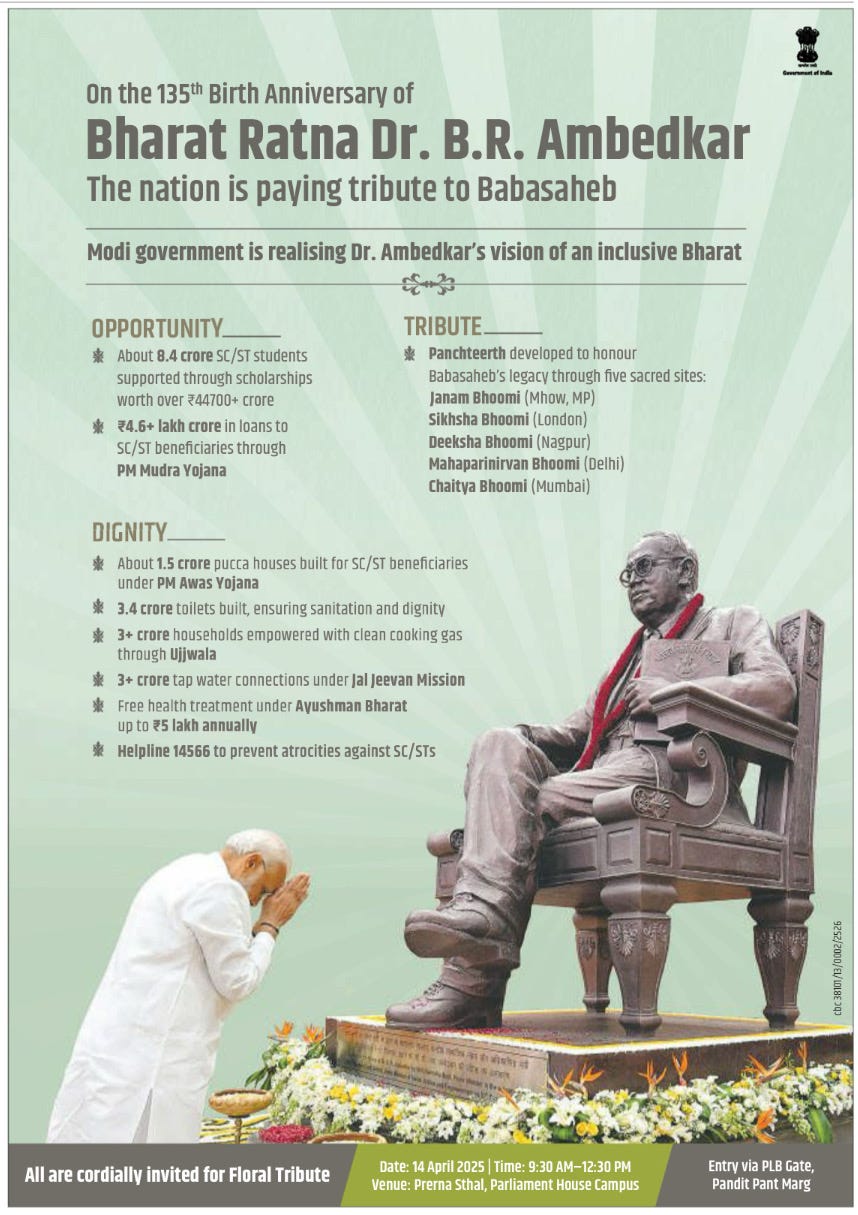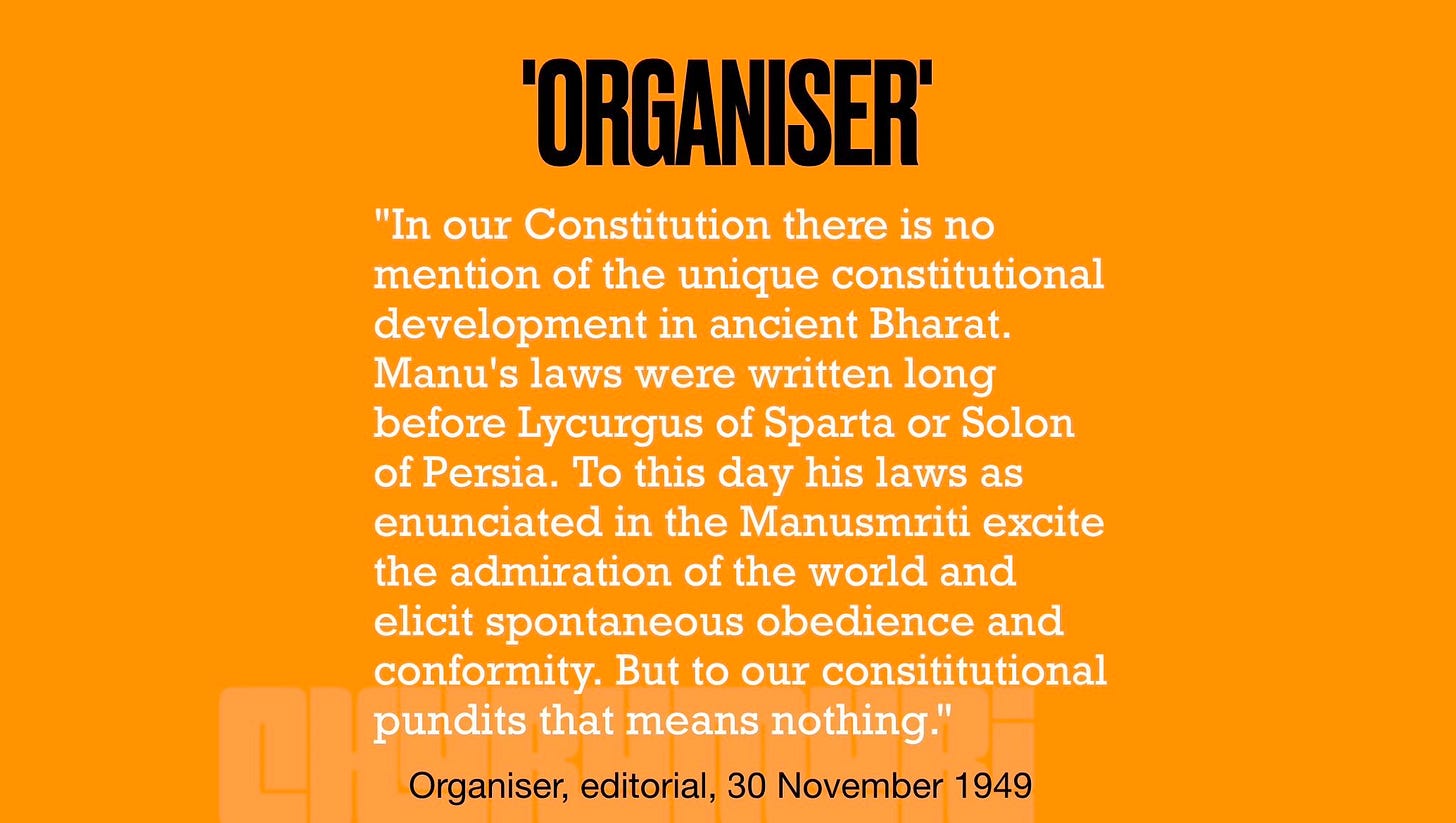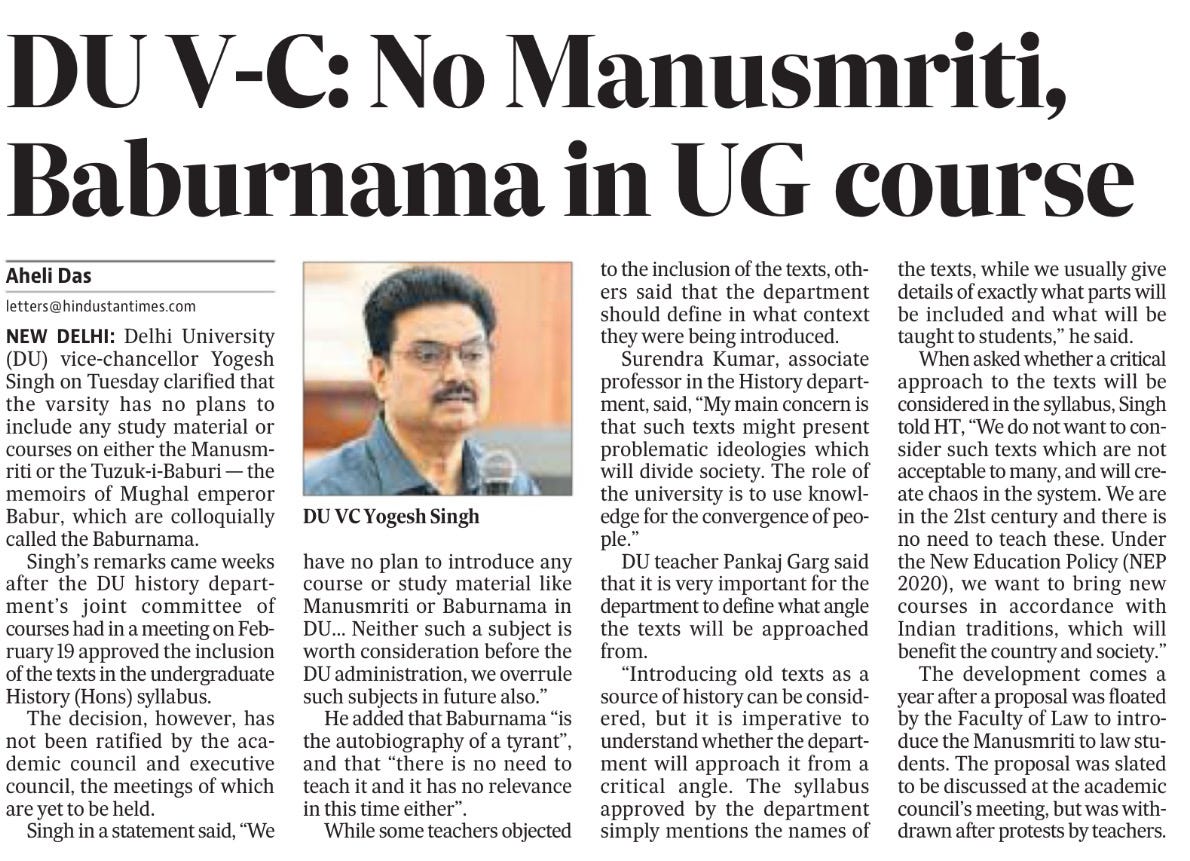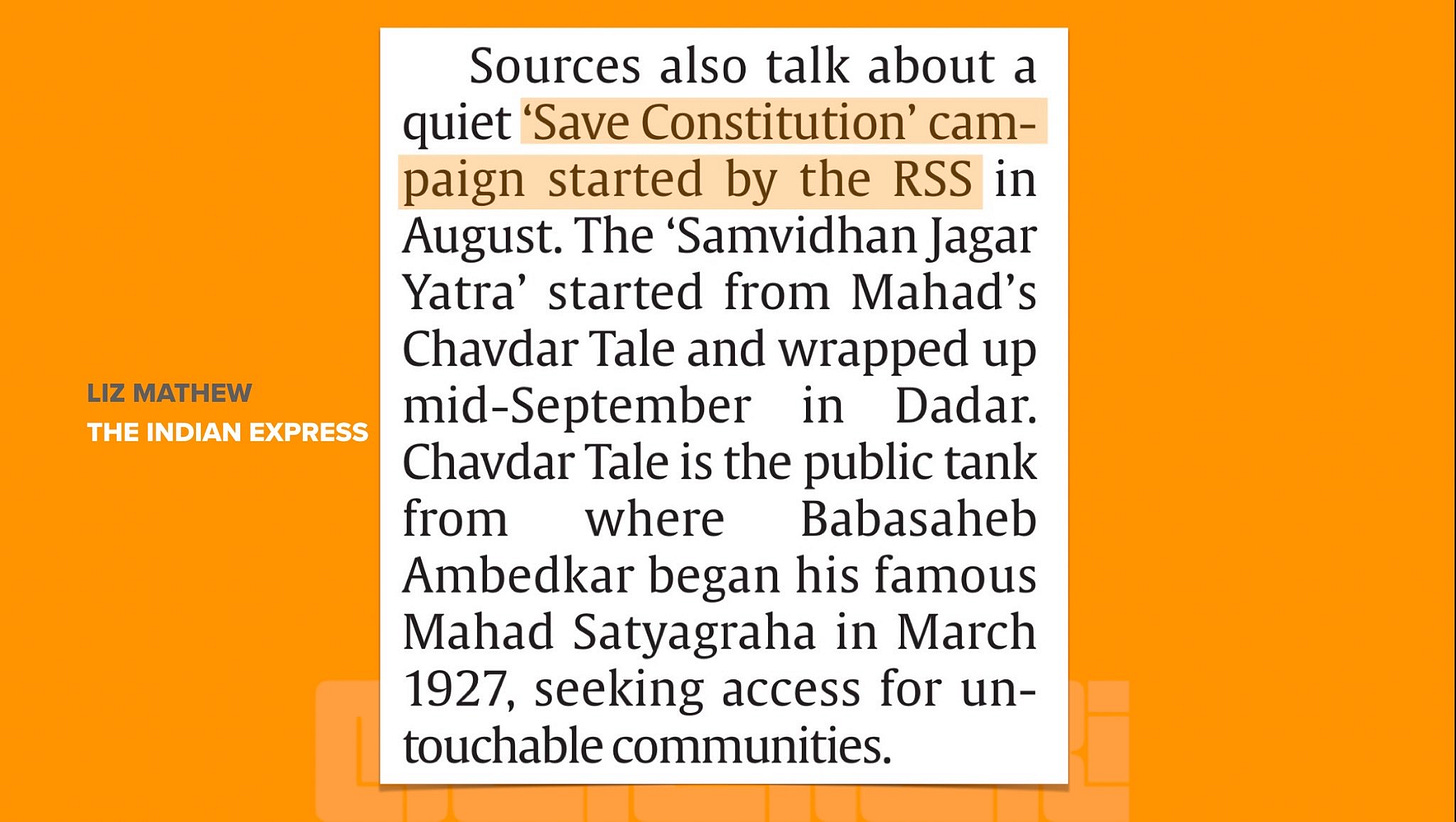Cut the tongue, hand and foot; thrust a red-hot nail into the mouth; pour hot oil into the ears: 20 gems from 'Manusmriti' to remember on Ambedkar's birthday
How the Constitution saved Indians from “Hindu Law” that Savarkar and Golwalkar wanted
Less than a year after a pocket edition of the Constitution of India blocked the BJP’s char sau paar juggernaut in the 2024 general elections---and barely weeks after Union home minister Amit Shah thundered in Parliament that it had become a fashion to chant “Ambedkar, Ambedkar, Ambedkar”---newspapers dated 14 April 2025 reveal the blazing hypocrisy.
Just the Delhi editions of India’s two biggest newspapers (The Times of India and Dainik Jagran) carry at least eight taxpayer-funded advertisements each featuring prime minister Narendra Modi, genuflecting before Dr B.R. Ambedkar. And in both dailies, defence minister Rajnath Singh offers a ghost-written tribute to the “visionary reformer”.
Delhi’s newly minted rubber stamp says Ambedkar Jayanti shall henceforth be a 15-day event, no less.
***
All this Monday-morning dramabaazi would have brought a smile behind the bushy moustache of M.S. Golwalkar.
In Bunch of Thoughts, the holy book of the RSS foot soldiers, ‘Guruji’ barely acknowledged Ambedkar’s document as something of note:
“The Constitution is just a cumbersome and heterogenous piecing together of various articles from various Constitutions of Western countries. It has nothing which can be called our own.”
It would have brought a frown on whoever wrote the editorial in the RSS mouthpiece Organiser of November 30, 1949:
“In our Constitution there is no mention of the unique constitutional development in ancient Bharat. Manu’s laws were written long before Lycurgus of Sparta or Solon of Persia.
“To this day his laws as enunciated in the Manusmriti excite the admiration of the world and elicit spontaneous obedience and conformity. But to our constitutional pundits that means nothing.”
It would have certainly entertained the father of Hindutva, V.D. Savarkar, who declared that “Manusmriti is that scripture which is most worshippable for our Hindu nation and which from ancient times has become the basis of our culture-customs, thought and practice…. Today Manusmriti is Hindu law.”
In circa 2025, realpolitik demands the Sangh Parivar’s best and brightest have to per force pay conspicuous obeisance to the Constitution and its architect even if they abhor them in private (or sometimes on the floor of Parliament).
***
Manusmriti has now become a bit of a red flag. But what did it really say that so excites blind bhakts of the Sangh Parivar and disgusts any sane human being with half a functioning brain?
The German Indologist Max Muller rendered a translation of Manusmiriti in 1886.
Here are some gems of “Hindu Law” that institutionalise caste hierarchy and normalise patriarchal norms, and stand in stark contrast to the Constitution of India piloted by Dr B.R. Ambedkar.
For the sake of the prosperity of the worlds, [the divine one] caused the Brahmana, the Kshtriya, the Vaisya, and the Shudra to proceed from his mouth, his arm, his thighs and his feet (I/31)
As the Brahmana sprang from Brahman’s mouth, as he was the first-born and as he possesses the Veda, he is by right the lord of this whole creation (I/93)
One occasion only the lord prescribed to the Shudras, to serve meekly even these other three castes (I/91)
Once-born man (a Shudra), who insults a twice-born man with gross invective shall have his tongue cut out, for he is of low origin (VIII/270)
If he mentions the names and castes (jati) of the twice-born with contumely, an iron nail, ten fingers long, shall be thrust red-hot into his mouth (VIII/271)
If he arrogantly teaches Brahmanas their duty, the king shall cause hot oil to be poured into his mouth and into his ears (VIII, 272)
With whatever limb a man of a low caste does hurt to a man of the three highest castes, even that limb shall be cut off; that is the teaching of Manu (VIII, 279)
He who raises his hand or a stick shall have his hand cut off; he who in anger kicks with his foot, shall his foot cut off (VIII, 280)
A low-caste man who tries to place himself on the same seat with a man of a high caste shall be branded on his hip and be banished, or the King shall cause his buttock to be gashed (VIII/281)
Let him not dwell in a country where the rulers are Sudras… nor in one swarming with men of the lowest castes (IV/61)
Let him not stay together with outcasts, nor with Chandalas, nor with Pukkasas (offspring of a mixed caste in which the mother is a Sudra) (IV/79)
Let him not give to a Sudra advice, nor the remnants of his meal, nor food offered to the gods, nor explain the sacred law to such a man (IV/80)
That kingdom where Sudras are very numerous, which is infested by atheists and destitute of twice-born inhabitants, soon entirely perishes, affected by famine and disease (VIII/22)
He who associates with an outcaste, himself becomes an outcaste after a year, not by sacrificing for him, teaching him, or forming matrimonial alliance with him, but by using the same carriage or seat, or by eating with him (XI/181)
***
Day and night woman must be kept in dependence by the males of their families and if they attach themselves to sexual enjoyments, they must be kept under one’s control (IX/2)
Her father protects her in childhood, her husband protects her in youth, and her sons protect her in old age; a woman is never fit for independence (IX/3)
Women must particularly be guarded against evil inclinations, however trifling they may appear; for, if they are not guarded, they will bring sorrow on two families (IX/5)
Let the husband employ his wife in the collection and expenditure of his wealth, in keeping everything clean, in the fulfillment of religious duties, in the preparation of food, and in looking after the household utensils (IX/12)
Women confined in the house under trustworthy and obedient servants are not well guarded, but those who of their own accord keep guard over themselves are well guarded (IX/12)
When creating them Manu allotted to women a love of their bed, of their seat and of ornament, impure desires, wrath, dishonesty, malice and bad conduct (IX/17)
***
Any wonder that during the historic Mahad agitation of December 25, 1927, a copy of Manusmriti was burnt in the presence of Dr B.R.Ambedkar, whom the Sangh Parivar extols today on the rebound?
Any wonder that Ambedkar, disgusted by its caste-based discrimination, injustice and cruelty, called upon Indians to commemorate December 25 as ‘Manusmriti Dahan Divas (Burn Manusmriti Day) in future?
Any wonder that the Narendra Modi government now observes December 25 as ‘Good Governance Day’?
***
(All excerpts courtesy Prof Shamsul Islam of Delhi University, from Know the RSS, Pharos Media)








